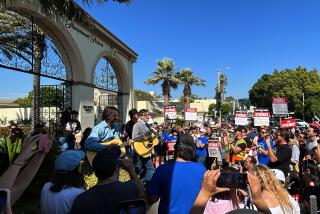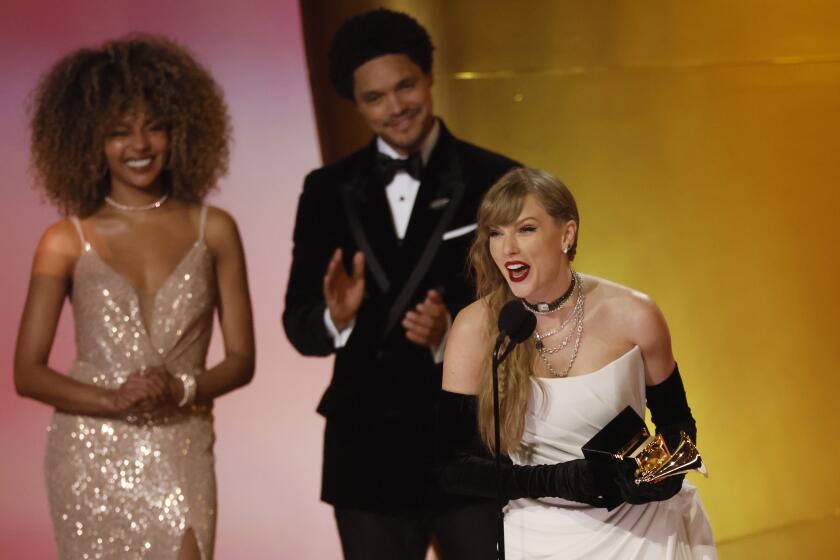There’s Trouble in the Air for Webcasters Over Music Royalties
- Share via
Two cents may sound like a pittance, but it’s a figure that has thrown the future of Internet radio into doubt and set off a bitter fight between the record industry and Webcasters.
The amount is the average price per hour, per listener that Webcasters will have to shell out to play music on their sites if a proposed schedule of royalty fees goes into effect later this month. The Webcasters say the royalties--which can quickly add up beyond the minimum of $500 per year and will be retroactive to 1998--will drive niche and independent programmers out of business, leaving only a few huge corporations controlling the music that’s heard. Just like what has happened with conventional radio, they warn.
The argument from the record companies and artists, on the other hand, is simple: It’s unfair to have their work used and not get paid for it.
“They’ll pay for bandwidth, but they won’t pay for the backbone of their industry,” said Ann Chaitovitz, national director of sound recordings for the American Federation of Television and Radio Artists.
On Wednesday, hundreds of Webcasters nationwide shut down their streams to protest and raise awareness of the issue. And Thursday, KCRW-FM (89.9), which operates three Internet music streams, began a weeklong series of editorials and interviews to educate listeners about the debate.
“It’s not just about KCRW, it’s about the whole philosophy of the Internet and an open source of music and culture,” said Jason Georges, KCRW’s Webmaster. “In broadcast there are very, very few sources of alternative music, while on the Web there are hundreds and hundreds of sources. And the concern is, all of that will go away.”
The battle began in 1998, when Congress passed the Digital Millennium Copyright Act, which was supposed to codify the rules and regulations for playing music over the Internet as well as compensate artists and record companies for the use of their work. They have never gotten royalties from conventional radio, because Congress for decades has accepted the argument that the stations offer invaluable free promotion simply by playing the music. The rationale for Internet royalties was the belief that, unlike with conventional radio, listeners could make perfect copies of the music off the Web--a possibility that Webcasters contend is not technically feasible.
When royalty negotiations between Webcasters and the recording industry failed, the U.S. Copyright Office authorized the Copyright Arbitration Royalty Panel, or CARP, to set the rates. The three-member panel came back in February, recommending that Internet-only Webcasters pay 0.14 cents per song per listener ($.0014), which, at roughly 15 songs per hour, comes to about 2 cents. Radio stations simulcasting on the Internet would pay half that, and noncommercial broadcasters would pay 0.02 cents. The minimum annual fee would be $500, but Webcasters contend the fees for medium-sized operations could escalate to hundreds of thousands of dollars.
“Unfortunately, the [copyright act] came into effect when the Web was overhyped and seemed like it could be profitable,” Georges said.
It also seemed as if it would be the promised land for music listeners and programmers who wanted to branch out from the sounds available over the airwaves and listen to things they couldn’t hear from their local stations. But in truth, Webcasters range from those dilettantes spinning their favorite tunes in their basements to industry behemoths, such as Clear Channel Communications, which simulcasts on the Web some of the 1,200 radio stations it owns nationwide.
“We want to work with the Webcasters. We don’t want to put anybody out of business,” said AFTRA’s Chaitovitz. “We want to foster the growth of these new outlets, as the breadth and diversity on the radio shrinks.
“What’s basically happened is the big guys, they don’t want to pay,” she said. “Most of the rates quoted are false. And the $500 isn’t going to put anybody out of business.”
She added that the Recording Industry Assn. of America and the artists’ unions want to work with the hobbyists, amateurs and other small fry and are already negotiating with college radio stations and the National Assn. of Community Broadcasters to set separate fees for nonprofits and small outlets.
But Kurt Hanson, publisher of the Radio and Internet Newsletter and organizer of Wednesday’s online “Day of Silence,” said the hobbyists will already be gone if the proposed fees go into effect. Most individuals get online using a service such as Live365.com, which, for fees starting at $6.95 a month, hosts 47,000 streams of programming ranging from U.K. garage bands to Christian music. “If Live365 can’t stay in business, those 47,000 hobbyists can’t broadcast,” he said.
Radio stations and Webcasters do pay royalties to songwriters, but those fees are based on a percentage of the station’s revenue and amount to far less than what the artist royalties could entail. Webcasters are asking that the Copyright Office amend the fee schedule to include a provision for paying a percentage of revenue--an amendment they say would save small Webcasters who make little or no profit by substantially reducing the fees they pay.
“Webcasters aren’t objecting to paying a royalty,” Hanson said. “What the RIAA doesn’t realize, and what people trying to sell records do realize, is that Internet radio is good for the industry. It gives airplay to dozens of styles that don’t get airplay on broadcast radio.... If they approve the CARP recommendations, it destroys the industry.”
The Librarian of Congress, whose agency oversees the Copyright Office, is scheduled to either impose or amend the recommended fees May 21, so Webcasters are lobbying members of Congress to influence its decision. In addition, the Copyright Office has scheduled a public round-table discussion of the issue for next Friday in Washington.
“The issue right now is one of timing. It shuts down the industry at a very sensitive point,” as it is starting to gain momentum in listeners and advertising, said Zack Zalon, general manager of Radio Free Virgin, a Los Angeles-based network of 46 music channels owned by British entrepreneur Richard Branson.
The music industry needs Internet radio to break new acts and expose listeners to a wide range of music, and Webcasters need the music to fill their shows. “Everybody needs each other here. We’re looking for a fair and balanced approach,” Zalon said, adding that he’s hopeful a consensus can be reached between Webcasters and the music industry sooner or later.
“The digital radio industry is going to be huge. It just takes a little bit of faith and a little bit of patience,” he said. “Maybe I’m being overly optimistic, but I think this is going to work out fine for everybody in the long run.”
More to Read
The biggest entertainment stories
Get our big stories about Hollywood, film, television, music, arts, culture and more right in your inbox as soon as they publish.
You may occasionally receive promotional content from the Los Angeles Times.










